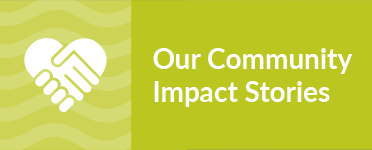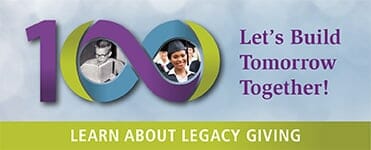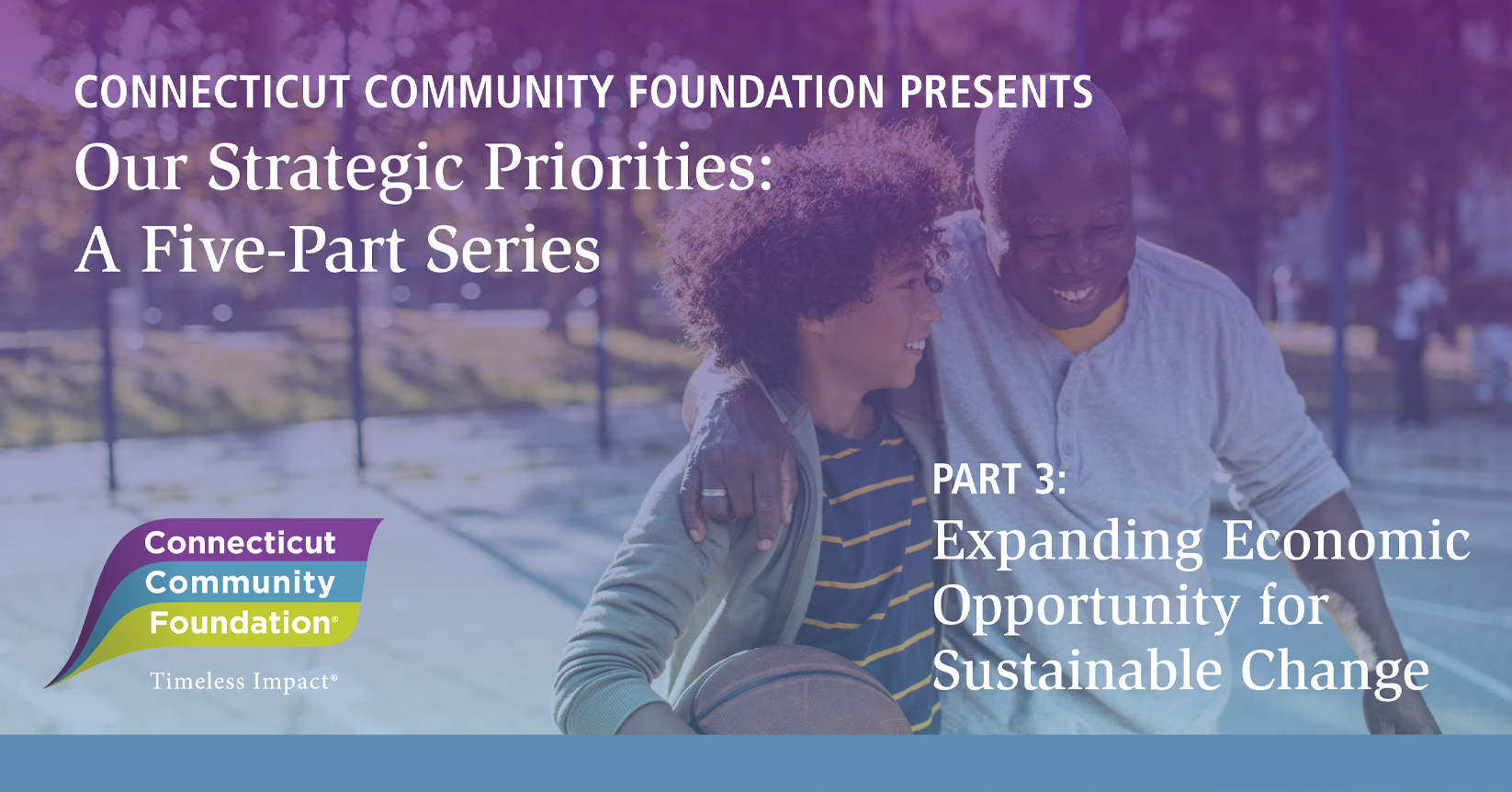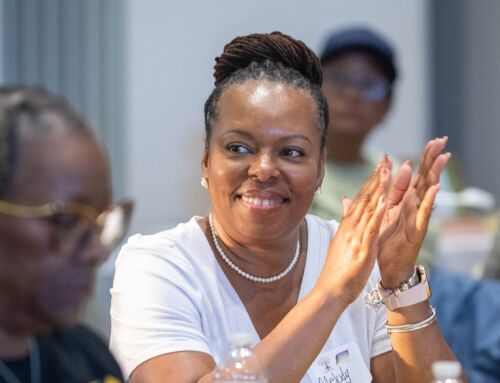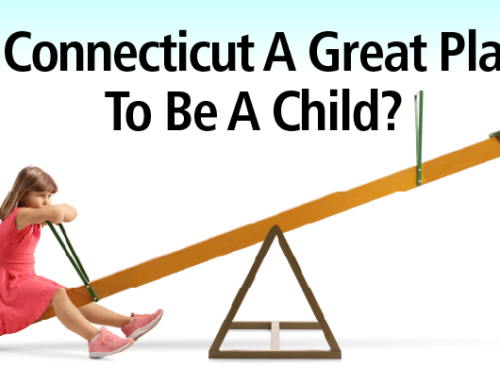Victor Lopez, alderman and executive director of the Hispanic Coalition of Waterbury, was born in Brooklyn and raised in Puerto Rico until moving to Waterbury when he was 14 years old. Lopez was a straight-A student in Puerto Rico. But because he didn’t speak English upon arriving in the United States, he was put in a remedial bilingual program. Due to implicit racial bias, Lopez’s language barrier was taken for a lack of intelligence. “I wasn’t given the tools I needed,” he says. “I wasn’t talked about in a positive manner. Now when I see people with a lot of potential I ask myself, ‘How can I help that individual? How I can help them become more powerful?’ Because they remind me of myself.”
As discussed in a previous article, Working Toward Health Equity is a Community Effort, viewing our work through the lens of race and equity helps Connecticut Community Foundation think beyond individual grants and consider the systems that create and perpetuate inequity in our community. We can direct our funding and our energies toward programs that strategically engage with people who need the most help. At the same time, the Foundation needs to make sure that we’re also dismantling the traditional charity dynamic that has plagued philanthropy. Whereas charity usually occurs in the short-term and takes the form of monetary donations and volunteering, trust-based philanthropy hopes to address the root cause of social issues and requires a more strategic, long-term approach that usually includes advocacy work.
“Our culture needs to reframe the entire conversation around economic opportunity,” says Ellen Carter, Foundation Vice President of Program and Strategy. “We need to reframe struggling communities in terms of their assets, not their liabilities.”
Kevin Taylor, architect and executive director of Neighborhood Housing Services of Waterbury, has dealt with implicit bias while trying to expand access to quality housing and homeownership in Waterbury. While working on the Adams Street Redevelopment Project, he encountered resistance from government funding agencies to installing granite countertops and wood flooring. The assumption was that affordable housing couldn’t–or perhaps even shouldn’t–be well made.
Taylor advocates renaming the entire endeavor. “Affordable housing” has become a racist dog whistle, a political signal to scare white voters. Taylor prefers to call it “workforce housing.” He says it’s housing for the people who work at the grocery store, at the local school or hospital, the people who make Waterbury operate and thrive in the day-to-day. “We all watch HGTV,” Taylor says. “We all want nice homes. Home should feel nice for us.”
“You get the price down enough in order for people to afford the home,” he says speaking to affordability. “But you also want them to be able to afford the home after the fact. Make it sustainable and durable and cheaper to maintain. Don’t put laminate countertop so the corner peels off after three years. Use a composite siding instead of wood so the wood doesn’t rot and you have to paint it every seven years. Spend money on solar panels now. That way you reduce energy bills later.”
Taylor reframes the economic opportunity question around investment instead of cost. The Foundation agrees. One of the keys to this approach is starting early. “We want to make sure there are on-ramps to the American Dream, to homeownership, to financial literacy, to wealth,” Carter says. “We want those on-ramps to come early and often. And we want them to be multi-generational.”
David Morgan, executive director of TEAM, Inc., a not-for-profit human services provider, has seen the benefits of this approach first hand. TEAM, Inc.’s largest program is Head Start, the early childhood education program that has delivered proven results since its inception in 1965. Today, Morgan and his organization are building on Head Start to create economic opportunities for Waterbury residents.
“Head Start provides high-quality early learning experiences,” Morgan says. “How do you also, and with the same intentionality, create experiences for adult caregivers to access education and training and break the cycle of poverty?”
One answer is a program called GAIN (Gain Access to Independence Now). GAIN leverages Head Start to provide job counseling, training, and placement for parents who are now benefiting from having access to daily child care. “We find that the vast majority wants more for themselves,” Morgan says. “But they’ve constantly been written off or judged too quickly. We find out their passions and their interests. We meet adults where they are and then find out where they want to go.”
This individualized, multigenerational approach chimes with the work Victor Lopez does at the Hispanic Coalition of Waterbury. Lopez speaks to the paradox of race and equity work. Systemic racism and inequity have deep historical roots and are baked into society at the macro level. And yet the solution isn’t one-size-fits-all. “You have to identify barriers and challenges and opportunities for people at an individual level,” Lopez says. “What works for one person may not be suitable for someone else.”
Lopez directs his caseworkers to get to know people intimately, then leverage that knowledge to help that person strategically. “Under the equality model we said, ‘Let’s give everybody $100 and see what they can do,’” he says. “Now we have case managers who develop short-term plans and long-term plans and we help them hold themselves accountable to the plan. Equality doesn’t get you very far. But when you practice equity you create value.”
Reggie Beamon, former state representative, executive director of the Waterbury Opportunities Industrialization Center (WOIC), Connecticut Community Foundation trustee, and co-chair of the Foundation’s Building Equitable Opportunities grant committee shares a similar passion for viewing people as investments in their own lives. Beamon is a long-time devotee of the late Reverend Dr. Leon Sullivan, Civil Rights activist, founder of the original Opportunities Industrialization Center, and author of Build, Brother, Build, which argues for overcoming systemic racism with Black economic empowerment. Beamon champions a community-based approach to building Black wealth and opportunity.
“There should not be benefactors from every ‘Bury except Waterbury,” he says. “If all the money is only coming from Southbury and Woodbury then we’re not connecting as a community.”
Beamon references the Self-Help Investment Program (SHIP) that dates back to segregation when the Black community had no choice but to raise capital on their own. Today, Beamon wants to foster a stakeholder mentality in Waterbury. “People are poor, but everyone has five dollars somewhere,” he says. “But that money makes people feel a part of things. Otherwise, it’s the same old story of liberals giving us money and telling us what to do.”
David Morgan, who is white, echoes this idea of economic opportunity being driven by the communities that need the help. “For white people that means giving up power,” he says. “Because right now those who are most affected by these policies are often not at the table. Sometimes they’re not even in the building. We need to have co-creation.”
What co-creation looks like could be the subject of its own article. But according to the Foundation’s Ellen Carter, it begins with introducing equity in the very beginning of the grant-making process. “When it comes to economic opportunity we need to talk about equity in funding, in program design, in implementation, and who really benefits from the work,” she says. “Most important of all we have ask this: Did the people most affected get to decide.”


